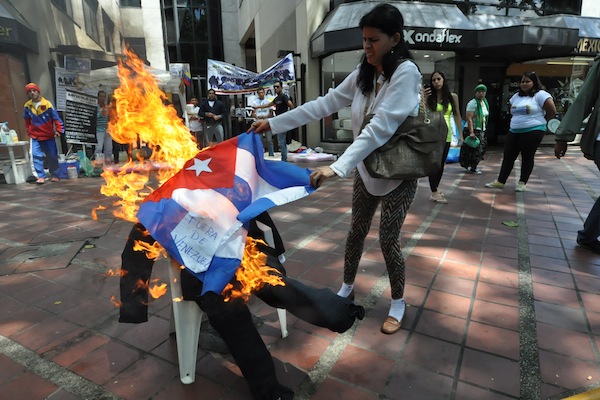
HAVANA, Cuba – The stunning images of the National Guard repressing marches in Venezuela reveal a stark contrast between the capability achieved by mankind to communicate globally at breakneck speed and the existence of apelike behavior: the authorities using their beasts against unprotected civilians.
Things are not going very well in a nation whose president, supposedly democratically elected at the polls to lead to a successful destination all its citizens and not just his followers, has adopted repression as a resource to establish “peace”, while he stokes the fires of hatred and polarization as a means to “solve” the crisis, behavior which evidences the failure of his political performance beyond the period of time he may yet stay in power.
The complexity of the situation in Venezuela is also reflected in that the protests being held steadily since February 12th are not initiated or led from the well-known opposition figures, but are mostly student and civic demonstrations against a government trying to establish itself as a dictatorship. The discontent has been growing from within society, not only because of the increasing shortages and the growing gaps and civil liberties violations, but also since President Nicolas Maduro’s Parliament sought and obtained full freedom to exercise despotism at will.
And, though control of the situation has slipped from Maduro’s fingers, (if he ever had any control), and though he is deserving of, but sadly destined to go down in the country’s history as the perfect scapegoat of the Castro-Chávez experiment that seems to be reaching its end, the truth is that the late Hugo Chávez would not have been able to sustain indefinitely the Bolivarian project either, in the presence of an economy that had begun its countdown at the time of his death, after 14 years of nonsensical policies. The outcome is only a matter of time.
The end of an alleged paradigm
It goes without saying that any leftist project inspired by a “Cuban Marx-Fidel-Martí” ideology — and for some years also “Chávez-Venezuelan” — which manages to achieve political power in Latin America, carries in itself all the essential elements that, though originally intended to perpetuate the new ruling class, leads instead to its failure: contempt for property, populism as a platform to support the political-ideological government programs, the destruction of the infrastructure and of the institutions inherited from earlier periods, the elimination or limitation (radical or gradual ) of civil liberties, the reformulation of the legal basis in favor of the interests of the new controlling power and the identification of an external enemy that hinders or prevents achieving government programs, among others.
This last element, which decades ago allowed F. Castro to polarize society from his power base by establishing a watershed between the government and its supporters (the worthy ones, the Patriots) and those in the opposition (the evil ones, the stateless), currently constitutes a political immaturity that is not delivering the dividends of previous decades, since the ever-villain U.S. government is not showing too much interest in taking part in Latin-American conflicts, an issue that weakens the regional nationalistic outbursts of a sub-continent with a historical past plagued by the interventions of its powerful northern neighbor.
And if that were not enough, the so-called “Bolivarian revolution” supports, in addition, an extra burden: while Castro’s revolution assumed, relatively successfully, a regional symbolic leadership managed to date – this must be acknowledged — with great skill by the Cuban leadership, Chávez’s revolution risked economic leadership by subsidizing the region’s leftist and other related projects, squandering generously Venezuela’s natural energy resources with the consequent deterioration of its very economy, ultimately leading to the current crisis. In short, just like Fidel Castro long ago depicted himself as an image of the Messiah, Hugo Chávez, in his time, ended up as the image of a patron saint, while the fickle masses will end up someday seeing Maduro as “the guy who ruined everything.”
As for the rest, and for the detriment of the radical leftists, Venezuelan oil is the lifeline of that pipe dream called ALBA, conceived as an economic locomotive of the “Latin American integration” which has allowed so much nationalist populism to be reborn in a region particularly addicted to sentimentality and caudillos. Little fortune could be predicted in an alliance whose central axis has its household upside down. Just in case, each fairly astute chieftain should be reviewing his accounts and stuffing his personal savings under the mattress. When XXI century socialism eventually stops developing in its Chávez cocoon, it will drag with it whatever parasites are feeding on Venezuela. It is possible that, at least in that nation, a very long sleep awaits the fundamentalist left.
Translated by Norma Whiting
Cubanet, 24 March 2014, Miriam Celaya
